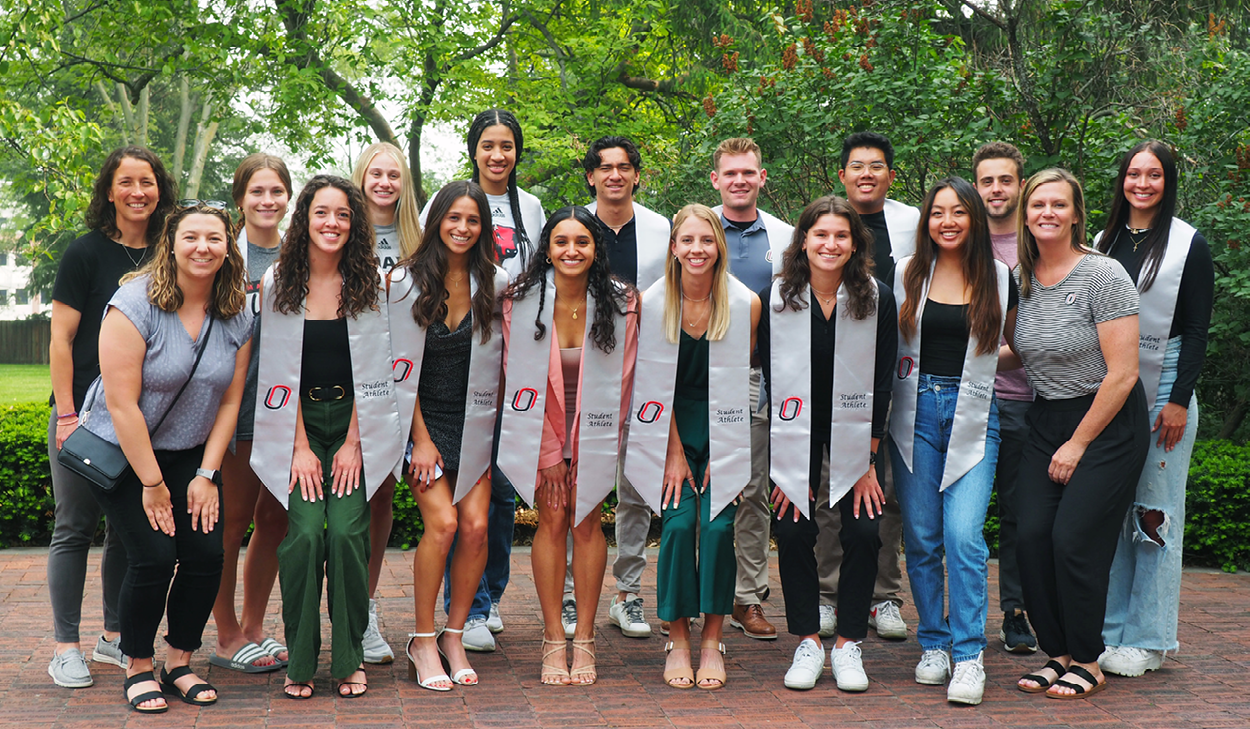
Omaha Athletics leads industry standards in student-athlete holistic care and development
by John Fey
The NCAA announced last fall that member institutions will be engaged in enhancing student-athletes’ lives through what it called a “holistic student-athlete benefits model.” UNO’s Adrian Dowell, vice chancellor/director of athletics, spelled out the directive in an opinion piece published last October in the Nebraska Examiner, and noted that Maverick student-athletes got the jump on that before the calendar turned to 2024.
Dowell wrote: “Fortunately, the University of Nebraska at Omaha saw this need well before the NCAA moved to make new requirements. Thanks to impactful support from our campus and community, we have proactively taken steps not only to adhere to the new Division I standards but to exceed them. We are committed to supporting the physical, mental and intellectual wellness of our Mavericks in a way that nurtures their success in the classroom, competition and to build future leaders for our community.”
Taking the lead for UNO’s compliance on those new standards was Lindsey Ekwerekwu, who serves as executive associate athletic director for student-athlete success/senior woman administrator. She leads the staff members who help enhance the overall student-athlete environment and experience. In her area, emphasis is placed on academics and student-athlete development, athletic training, strength and conditioning, Title IX compliance, mental health and nutrition services.
Ekwerekwu, who arrived at UNO 12 years ago, said she and her colleagues have been doing much of that type of work for years.
“We’ve always been providing support to our student-athletes in many of these areas, both internally and partnering with campus units, whether that was academic and career development or mental health education,” she said. “But really what the NCAA is doing is asking member schools to create a more streamlined environment of support to meet the needs of the modern-day student-athlete.”
Although some pieces of this puzzle are enhanced, Omaha Athletics got a jump on the new standards. “The nice thing is we’re ahead of it. We’ve been doing a lot of the work to implement this education over the last 18 months.”
You might think to reach the new NCAA standards, Ekwerekwu’s department workload would increase. To a certain extent, she said, that’s true.
“We’ve partnered with campus colleagues in the Division of Innovative and Learning-Centric Initiatives to create a microcredential called Mav360,” she said. “This partnership with campus has been instrumental in helping us deliver this programming in an easy to consume, streamlined manner that is easily accessible to our students. We are thrilled with how Mav360 allows us to deliver real-time content in ways that make sense for the busy student-athlete.”
A key focus area within Mav360 is mental health and nutrition education.
Lending aid to the latter areas is Dr. Taryn Ninemire, senior associate athletic director for athletic performance. Entering her ninth year at UNO, she takes the lead in sports medicine, sports physiology, nutrition, mental health and strength and performance. It’s quite encompassing, she said, but necessary for the overall success of the student-athlete.
“Athletes have to focus a lot of time on training, competing, physical/mental preparation, as well as studying, spending time with their families, friends and quality of life,” Ninemire said. “We understand that time management is key to that success. We have tried to support our athletes by being aware of these demands and incorporating resources that allow for enhanced time management.”
Helping to reach those goals, team physicians make on-campus visits twice a week to make it more convenient for athletes who otherwise would have to wait in a doctor’s office to be seen. The university’s microcredential course provides athletes educational resources that they can access from anywhere, anytime that works for them. New staff have been hired in the areas of clinical and sports psychology, mental health and sports nutrition.
Have the athletes taken advantage of these resources, and are they appreciative? Absolutely.
Senior hockey player Nolan Sullivan said the off-ice support helps freshmen comfortably adjust to life after high school.
“They take care of the freshmen and the guys who are at risk as well,” he said. “The tutoring options and other different things are really good resources to help you get your stuff done. Lindsey and the others are awesome.”
Hockey players in particular miss a lot of class time with so many road trips, and that’s where Ekwerekwu’s staff comes to the rescue.
“The biggest thing is connecting with our teachers about our travel schedules,” Sullivan said. “Having a mediator between the two is super helpful.”
Regan Zimmers, a graduate student on the soccer team, said she owes a lot to Ekwerekwu and the others in the department.
“I honestly can’t think of something that Lindsey and her staff haven’t helped me with in my time here at Omaha,” Zimmers said. “Without a doubt, I know I would be so lost without the help of Lindsey and her staff.”
Ekwerekwu takes pride in the successes they’ve had with student-athletes, the bottom line being their amazing overall grade-point average and graduation rates.
“I can tell you this, for our fall 2023 semester GPA for all of our student-athletes was a 3.48,” she said. “That’s the 23rd consecutive semester of a 3.30 or higher. Our most recent graduate rate is 93 percent, and that likely will go up.”